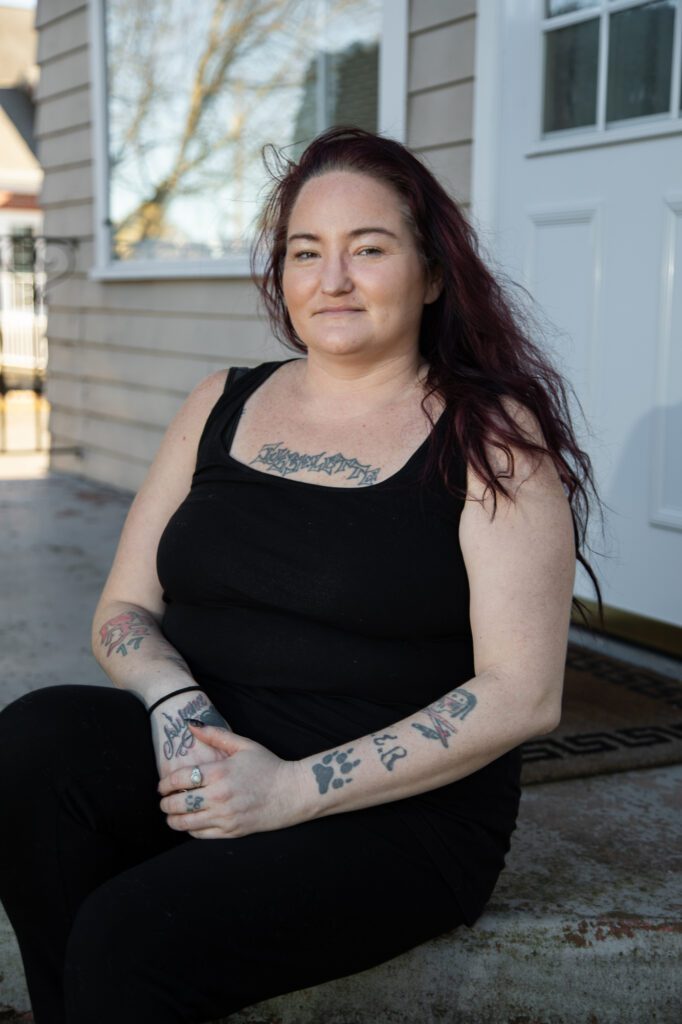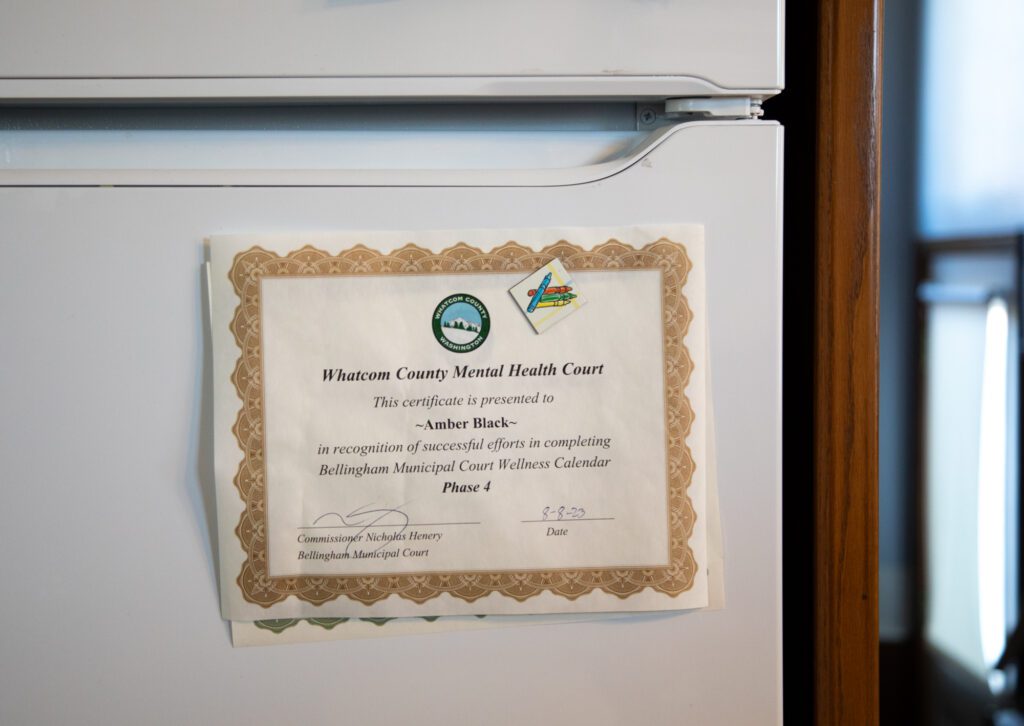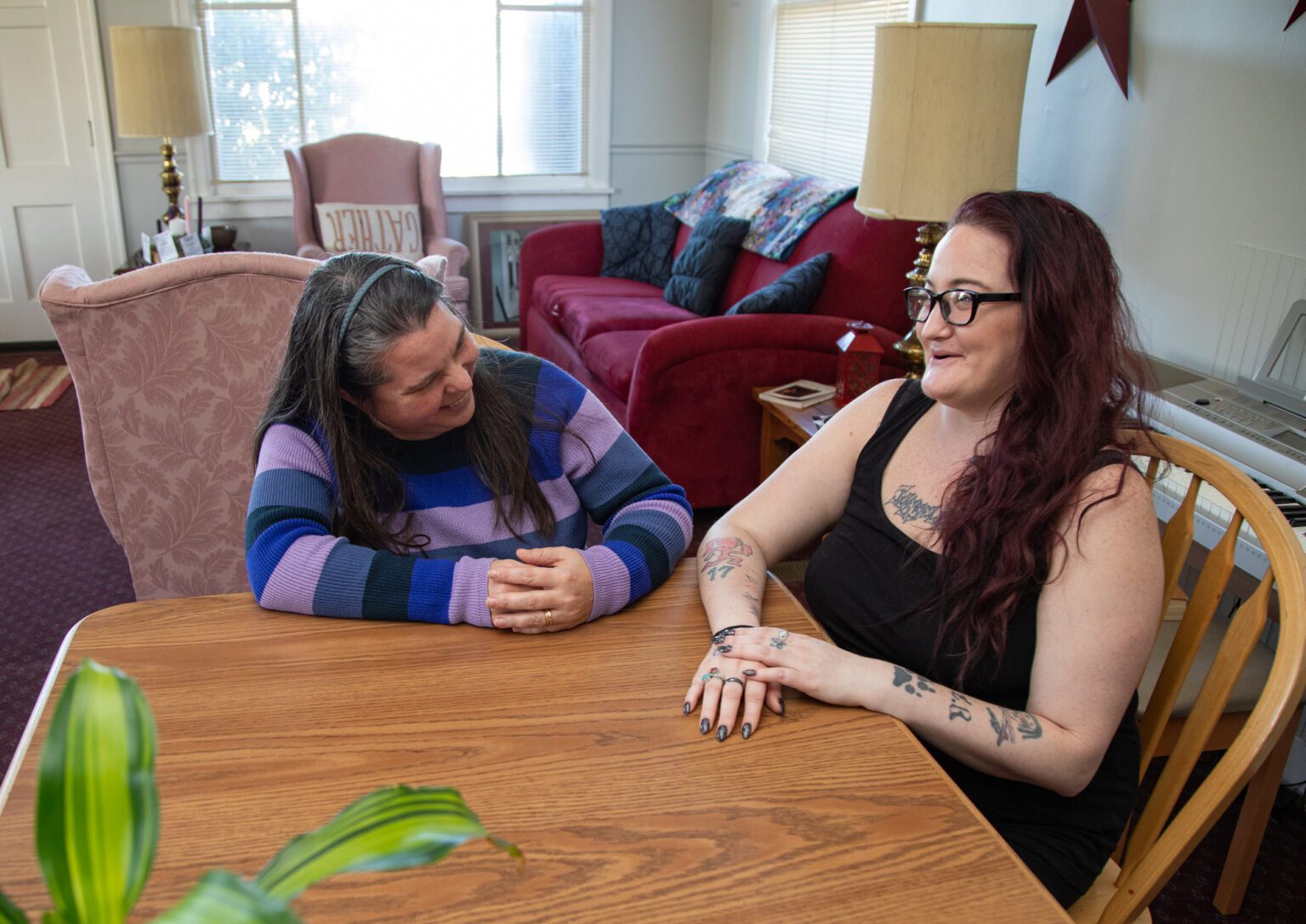The courtroom was packed on a recent Tuesday, with dozens of people lining the aisle as Amber Black walked amid cheers, music and applause to receive her diploma during graduation from Mental Health Court.
In addition to Black’s support circle of friends and family, Bellingham City Council members, members of the Opportunity Council’s Homeless Outreach Team and police officers looked on, smiling.
Then, Commissioner Nicholas Henery said the words that had been nearly two years in the making: “The charges are dismissed.”
Black, 38, entered Whatcom County’s Mental Health Court program in 2022 facing nine gross misdemeanor charges through Bellingham Municipal Court and one felony assault charge through Whatcom County Superior Court. She graduated last month with a new outlook on life and newfound confidence, she said in an interview.
Mental Health Court is one of several diversion programs run through Whatcom County’s health department — an 18-24 month “therapeutic court.” Started in 2015, it’s an alternative to jail for people whose mental health challenges have brought them into the judicial system, and it provides wraparound support.
“As overwhelming as it can be when you’re still not even clean and sober yet, but you want to be and you want to succeed at something — it may seem like you’re a lost cause and you can’t attain that, but healing can happen pretty quick after you start,” Black said. She thought she wouldn’t be able to hold a conversation like her interview with Cascadia Daily News, but said, “now I can do this and more.”
People who face criminal charges, have a serious mental illness, and meet other criteria can be referred into the program, which currently has a capacity of 50 people. Sixty people have now successfully completed the program.
From ‘high risk’ to ‘wildly successful’
Sitting in her Lynden home she shares with a friend, Black admitted she’d agreed to an interview because it pushed her outside of her comfort zone, something she said her sponsor encouraged her to do.
She spoke with confidence when discussing the program she credits with turning her life around.
Black was in jail when health department staff, including mental health court program manager Robin Willins, met with her to suggest the diversion program as a possible path for her.
“When I met her in the jail, she was really at a point where she said, ‘I don’t want to live this way anymore,’” Willins said.
Black said she didn’t know it then, but when she looks back on that time, “that was probably my moment of desperation to change my life.”
Willins said before Black was in the program, she had frequent encounters with law enforcement and emergency medical contacts.
“She hadn’t had stable housing in a really long time,” Willins said. “She really struggled with her mental health and accessing consistent care and stability with medications, and alongside that, a co-occurring substance use disorder.”
Willins said Black was almost ineligible for the program — she was someone that traditionally, the prosecutor would have said was too “high risk.”
“One of the prosecutors and the defense attorney, they both looked at each other and said, ‘Well, why shouldn’t we try it? Let’s try it because if it works, can you imagine if it works?’” Willins said.
And she was “wildly successful,” Willins added.
Black went from jail to treatment, and then went into Lighthouse Mission’s Agape program.
“She was able to leave treatment into a stable, supported shelter environment …” Willins said. “You could see all these pieces fall in place, and gradually as she got her support network around her, the growth was pretty amazing.”

Black said she was initially scared she wasn’t going to stay compliant with the program and that she wouldn’t succeed or get along with the people running the program, “but it was the complete opposite.”
She said the program was “gentle, but in a healthy way.” They never forced her to do anything, she said, but “we didn’t get to slide with anything. It was just the right amount of authority and help and structure.” In the program, she had people who would go with her to appointments and people she could call when she needed support.
She said she appreciated that they trusted her and expected her to follow through on her end of the bargain, but offered help anytime she needed.
“I started finding myself calling them anyway, and I’m like, ‘I really don’t need help, but I just wanted to call you,’” she said.
The day-to-day in the program depends on the level of care, but it can be as intensive as three days a week of contact. Every week, or every second week, depending on the court, all program members go to court for a check-in. They’re evaluated on how they’re doing, and if they’re doing well, are given a gift card.
As the program goes on, members move through five phases to establish services, understand their mental health needs, put a plan for recovery into practice, begin to give back to the community and develop a plan to continue without all the support. A person also has to be sober for at least six months to graduate. Most have charges related to their mental health condition dismissed upon graduation.
For Black, this meant her 10 charges were dismissed.
Willins said having the charges dismissed is an essential incentive for people involved in the program, given how much a criminal record can impact housing, employment and educational opportunities. And often people are acquiring these charges and losing their jobs in the context of “their mental illness,” Willins said.
‘Gold standard’ for Mental Health Court
For Black, the Mental Health Court graduation was the first time she’s ever graduated. “It was a big confidence booster for me,” she said. She said the number of people who showed up at her graduation made her feel very loved.
At Black’s graduation, Commissioner Henery said he couldn’t put into words how much Black had changed since she began the program. The defense attorney, Robert Lockhart, called her the “gold standard” for Mental Health Court.

Black moved into her Lynden house about a year ago, and she said being there has been a really “stable and healthy support.”
“It’s been the longest chunk of time in my life where there’s no dangers or no drama or anything like that,” she said. “It’s been really helpful to my healing process.”
Black said everyone in her life said she’s a completely different person from when she started. While she has trouble seeing those changes in herself, she’s social these days and more open talking about her story. She said she’s also learned how to be consistent and honest, no matter what.
“I’m starting to learn that what I have to share in my experience is important. It’s really helpful because I used to not feel like anything about me was important,” she said.
Black said she’s proud that she was “brave” enough to do something different with Mental Health Court. She’s now enjoying retreats through her 12-step program, and continues to work on her GED.
“One of the big reasons why I’m doing this, too, is that I hope some of my friends that are still homeless or still in active addiction will be like, ‘OK, Amber did it, so we can do it,'” she said. “… There’s a chance to take back your life.”
Charlotte Alden is CDN’s general assignment/enterprise reporter; reach her at charlottealden@cascadiadaily.com; 360-922-3090 ext. 123.




